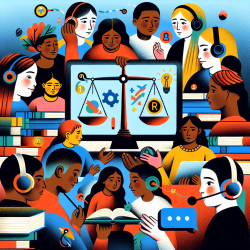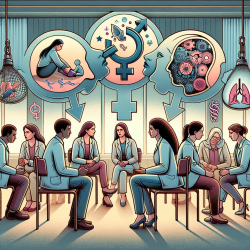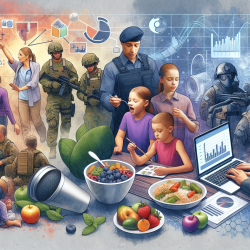Introduction
In the field of speech-language pathology, making data-driven decisions is crucial for creating effective therapy strategies. As practitioners, we often look to research from diverse fields to enrich our understanding and improve outcomes for children. One such area of interest is the study of reparations for the transatlantic slave trade, as discussed in Rhoda E. Howard-Hassmann's research article, "Should the USA Offer Reparations to Africa for the Transatlantic Slave Trade?" This research not only sheds light on historical injustices but also provides insights that can enhance our approach to online therapy services in schools.
Understanding the Impact of Historical Context
Howard-Hassmann's research emphasizes the importance of acknowledging historical injustices and their long-term effects on communities. For speech-language pathologists working with diverse student populations, understanding the historical and cultural contexts of the children we serve is essential. By integrating this awareness into our practice, we can tailor our therapy approaches to be more culturally sensitive and responsive to the unique needs of each child.
Implementing a Truth Commission Approach
The concept of a truth commission, as proposed in the research, involves establishing an agreed narrative about historical events and their impact. In the context of online therapy, this approach can be adapted to create a collaborative environment where children feel heard and understood. Encouraging open dialogue and actively listening to students' experiences can foster trust and improve engagement in therapy sessions.
Apology and Empathy in Therapy
Apologies and expressions of empathy are powerful tools for healing. In therapy, acknowledging a child's feelings and experiences can significantly impact their progress. Drawing from the reparations research, practitioners can incorporate these elements into their sessions, creating a supportive atmosphere where children feel valued and respected.
Symbolic and Practical Reparations in Education
Howard-Hassmann suggests symbolic and financial reparations as part of the healing process. In the educational setting, this can translate into providing additional resources and support for students from historically marginalized communities. Online therapy platforms like TinyEYE can play a pivotal role by offering tailored interventions and resources to bridge educational gaps and promote equity.
Encouraging Further Research
While the research on reparations provides valuable insights, it also highlights the need for continued exploration and understanding. Practitioners are encouraged to delve deeper into the historical and cultural contexts of the populations they serve. By doing so, we can develop more effective and inclusive therapy strategies that address the diverse needs of all students.
Conclusion
Incorporating the outcomes of reparations research into online therapy services can enhance our ability to create meaningful and lasting change for children. By understanding historical contexts, fostering open dialogue, and providing equitable resources, we can improve educational outcomes and support the holistic development of every child.
To read the original research paper, please follow this link: Should the USA Offer Reparations to Africa for the Transatlantic Slave Trade?










